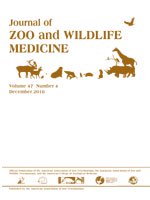The level of stress that animals endure during capture, handling, transportation, and release processes is a major concern of animal reintroduction projects. Animals under chronic stress are more susceptible to disease and other deleterious issues that could reduce their survival in a new environment. Northern river otters (Lontra canadensis) have been reintroduced in 22 states in the United States and may be susceptible to developing chronic stress during the reintroduction process. We assessed stress levels in five river otters captured from wild populations in Washington, held in captivity for up to 21 days, and then transported to New Mexico for reintroduction. Glucocorticoid levels in fecal samples of all otters tested decreased from when they were held captive in Washington to the time of release. This outcome suggests that habituation to captivity before transport and release may serve to minimize the likelihood of an otter being released while experiencing a potentially burdensome level of stress.
How to translate text using browser tools
1 December 2016
STRESS LEVELS IN CAPTURED RIVER OTTERS (LONTRA CANADENSIS) DECREASED AFTER TRANSPORTATION TO REINTRODUCTION SITES
Rebekah T. Taylor,
Jennifer A. Wong,
Thomas L. Serfass
ACCESS THE FULL ARTICLE
Corticosterone
fecal glucocorticoids
Lontra canadensis
reintroduction
River Otter





